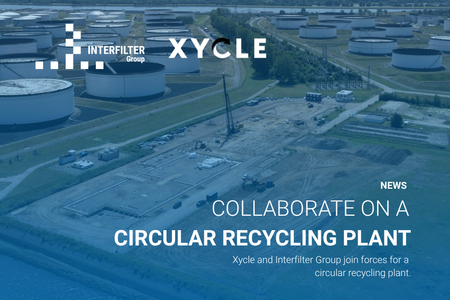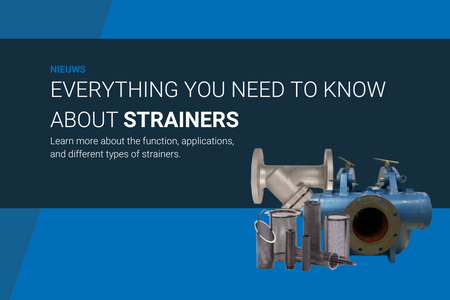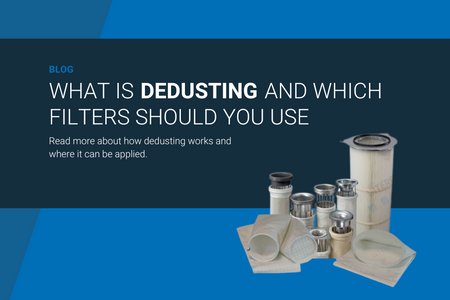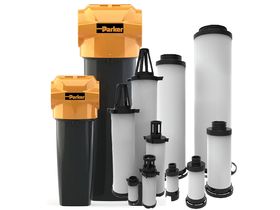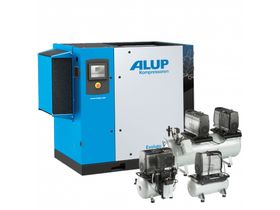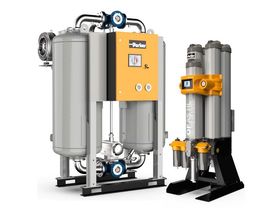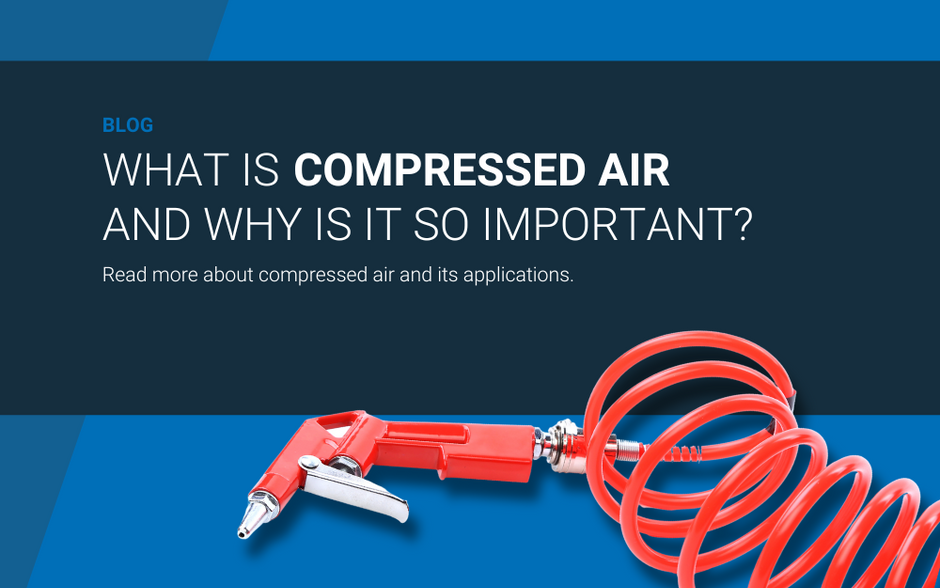
 (2).png) Compressed air, a versatile force that is often overlooked, plays a crucial role in a wide range of industries and applications. From production processes to medical equipment to tire inflation and more, compressed air has become an indispensable resource in this modern world. But what exactly is compressed air and why is it so important? In this blog, we delve deeper into the world of compressed air, explore its uses, and examine the aspects of safety, environment, quality, compression techniques, and energy consumption associated with it.
Compressed air, a versatile force that is often overlooked, plays a crucial role in a wide range of industries and applications. From production processes to medical equipment to tire inflation and more, compressed air has become an indispensable resource in this modern world. But what exactly is compressed air and why is it so important? In this blog, we delve deeper into the world of compressed air, explore its uses, and examine the aspects of safety, environment, quality, compression techniques, and energy consumption associated with it.
What is compressed air exactly?
Compressed air, as the name suggests, is air that has been pressurized. This is achieved by compressing air using compressors. When air is compressed, the air molecules take up less space, increasing the air pressure. This results in compressed air with higher pressure than the surrounding atmosphere.
Where is compressed air used?
Compressed air has a wide range of applications in various industries. Here are some common situations where compressed air is used:
Industrial use of compressed air
Compressed air is widely used in industry for activities such as powering machines and tools, pneumatic systems, paint and coating applications, and much more. It is an energy-efficient choice that offers flexibility in numerous production processes.
Compressed air in the medical sector
Compressed air is used in medical devices such as ventilators and anesthesia systems. It plays a crucial role in hospitals and healthcare facilities to provide patients with the necessary oxygen.
Compressed air in the food industry
In the food industry, compressed air is used for packaging, filling, and transporting food products. It is a clean and safe option that prevents contaminants from entering the food.
Automotive industry
Compressed air is used for operating brakes, suspension systems, and tires in vehicles. It is also used for paint spraying and powering production machinery.
Use of compressed air for energy generation
Compressed air is used in power plants to drive turbines, generating electricity.
Compressed air for environmental management
In water treatment plants, compressed air is used for aeration to allow bacteria to grow that break down impurities in the water.
Safe and sustainable compressed air
Compressed air offers several benefits in terms of safety and environment:
- Safety: Compressed air is safer than electricity in certain environments, especially in hazardous areas. It does not spark and can be used in potentially dangerous conditions.
- Environmentally friendly: Compressed air is a clean energy source, as it does not generate combustion or combustion products. This reduces air pollution and greenhouse gas emissions.
Compressed air quality
 The quality of compressed air is vital, especially in applications where air quality is crucial, such as in the medical and food industry. Impurities can reduce equipment performance and compromise product quality. Therefore, filtration and purification processes are essential to ensure clean and reliable compressed air. The quality of compressed air is expressed in different classes through ISO 8573. You can read more about this in our whitepaper on ISO 8573.
The quality of compressed air is vital, especially in applications where air quality is crucial, such as in the medical and food industry. Impurities can reduce equipment performance and compromise product quality. Therefore, filtration and purification processes are essential to ensure clean and reliable compressed air. The quality of compressed air is expressed in different classes through ISO 8573. You can read more about this in our whitepaper on ISO 8573.
Compression techniques
A compressor is used to compress the compressed air. This can be done using different compressors, depending on your situation. Different compression techniques used to generate compressed air are:
- Piston compressors: These work by compressing air in a cylinder using a piston.
- Rotary screw compressors: Two screws are used to compress air.
- Turbo compressors: These use a radial or axial turbine to compress air.
Thanks to our partnership with LibAir, we can provide your compressed air system with compressors from the CompAir brand. View the product page for more information or request a quote here.
Conditioning compressed air
To optimize the performance of your compressed air compressor and ensure that the compressed air is of high quality, it is advisable to condition the compressed air. In short, this means filtering the compressed air so that the particles that can adversely affect your process or compressor are not present in your process. Interfilter offers various types of compressed air conditioning from the brands Parker Hannifin, Hiross, Zander, Domnick Hunter, Transair, and Balston:
- Condensate treatment: Oil and water separators are legally required in the Netherlands to ensure that the water and oil generated as a result of condensing vapor or gas are treated to make it suitable for reuse or clean disposal.
- Compressed air filters and housings: Compressed air filters and housings remove contaminants from your compressed air stream. Contaminants can include solid particles, oil, or moisture. By filtering out this contamination from your compressed air stream, the quality of the compressed air stream improves, and your pneumatic tools, machinery, and piping last longer.
- Adsorption dryers: An adsorption dryer is a type of air dryer that removes moisture from compressed air using the Pressure Swing Adsorption principle. The PSA principle is the process where the water molecules from the compressed air adhere to the desiccant (activated alumina), the adsorption bead.
- Refrigeration dryers: A refrigeration dryer is a type of air dryer used to remove moisture from compressed air. Compression causes the air to become warmer, and when this air cools and then warms up again, the moisture in the air condenses and forms water droplets that are discharged by a drain.
- Chillers: A chiller provides a precise solution for controlling a constant cooling temperature. Industrial chillers are designed for safe and reliable operation to cool coolants. All Hyperchill devices guarantee to maintain the set temperature limit under varying heat conditions.
- Compressed air pipelines: For your compressed air piping system, you have come to the right place at Interfilter Group. As a Parker distributor, we supply complete piping systems from the Transair brand. Parker Transair is an advanced and modular piping system. This piping system provides a reliable and efficient way to transport (compressed) air and gas in industrial applications.
Compressed air energy consumption
Although compressed air is efficient in its use, it is important to pay attention to energy consumption. Compressors consume energy, and inefficient systems can lead to unnecessary waste. Optimizing compression processes and regulating pressure can help minimize energy consumption.
Does compressed air suit your process?
When choosing the right compression technique for your specific process, several factors are important. The nature of the application, the required air quality, the desired energy efficiency, and the operational requirements all play a role in determining the optimal compression method. Understanding the unique needs of your business and processes is essential before making a decision.
By considering which technique best suits your process, you can not only optimize performance but also increase sustainability and minimize environmental impact. Whether it's choosing between different compressors or implementing filtration and purification processes, striving for an informed and thoughtful decision will benefit both the efficiency of your processes and the ecological footprint of your operations.
Interested in a non-binding advisory meeting?
Would you like to learn more about our compressed air products and how they can optimize your industrial processes?
Interested in requesting a quote directly? Feel free to call the general number +31 (0)181 32 08 88 or fill out the contact form, and we will respond within 4 hours during office hours.
 EN
EN
 NL
NL PL
PL 

